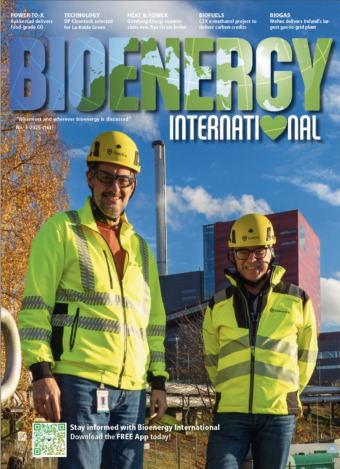Responding to the Swedish Government's 2026 Budget Bill, which was launched on September 22, 2025, Swedish Bioenergy (Svebio) notes that it contains several "positive messages" for bioenergy.
The Government’s proposed state budget for 2026 contains a historically large amount of reform space, approximately SEK 80 billion (≈ EUR 7.25 billion).
The single largest item affecting bioenergy is increased appropriations for the Kraftlyftet (“Power Lift”) grant investment program, totalling SEK 5 billion (≈ EUR 452.8 million), to enable a secure, fossil-free, and efficient power supply.
The aim is to increase capabilities for dispatchability and security of supply in all power system operating states.
Other important Budget Bill items include a SEK 0.09875/kWh (≈ EUR 0.00894) reduction on the energy tax on electricity, bringing it back to 2022 levels, and the introduction of a cost cap for household electricity.
However, Svebio notes that there are no measures to support district heating customers in the event of price increases, adding that “further reforms are needed to strengthen both the energy system and protect consumers.”
Half of the country’s space heating comes from district heating, and in apartment buildings, the share is approximately 90 percent.
It is very positive that the allocations to Kraftlyftet are increasing. District and cogeneration contribute to a secure energy supply and the local and regional electricity supply, partly by reducing the need for electricity for heating, and partly by providing much-needed local and dispatchable electricity production. However, additional policy instruments are needed to take advantage of the system benefits of district and cogeneration, said Anna Törner, CEO of Svebio.
Continued investments in BECCS
The Government cautions that this budget will not meet national climate targets but will continue work on building a Swedish market for bioenergy with carbon capture and storage (BECCS).
Sweden is particularly well-suited for BECCS, thanks to the extensive use of biomass in the district heating and cogeneration sectors. Further support for BECCS has been announced.
The government notes that greenhouse gas emissions have decreased since 2010, but that they increased sharply in 2024. The pace of action therefore, needs to step up to reach the interim target for 2030 on time. Bioenergy and BECCS have important roles to play here, continues Anna Törner said.
The Government is also clear that strong ownership and user rights are the basis for a greater use of the potential of forests for the economy, climate, and environment.
The national definition and clear classification criteria for old-growth forests will contribute to the socio-economically efficient implementation of the new EU rules.
The Government believes that national self-determination over forest issues should be protected, and detailed regulations of forestry should be avoided.
Strengthened Climate Leap program
Increased investments in fossil-free future technology are also in the Budget Bill and strengthened in the Klimatklivet (“Climate Leap”) program.
These include investments in converting away from fossil fuels, expansion of charging infrastructure, and better waste management.
Svebio also notes the following positive announcements in the Budget Bill:
- To make the environmental assessment process more flexible, efficient, and predictable, the Government intends to establish a new authority for environmental assessments. Measures are needed to shorten permit processes.
- Appropriations for energy preparedness are more than doubling.
- Increased appropriations for the Swedish Forest Agency, which will provide better conditions for shortening permit processes.
- Support for biogas production is being increased and will amount to over SEK 1 billion (≈ EUR 90.56 million) in 2026.
- The Government has previously announced continued tax exemption for highly blended biofuels outside the reduction obligation and a broader definition of biogas from a taxation viewpoint.
While production support for biogas is being increased, it is directed to manure-based systems only, which Svebio highlights risks distorting competition.
Svebio notes that the carbon dioxide tax on bio-oils for heating purposes is being maintained. It was introduced in 2021, and it was announced in the Tidö Agreement that it would be reviewed.
The Government has nevertheless chosen to continue taxing these green oils, no doubt a discussion point at the upcoming Svebio Fuel Market Day.



